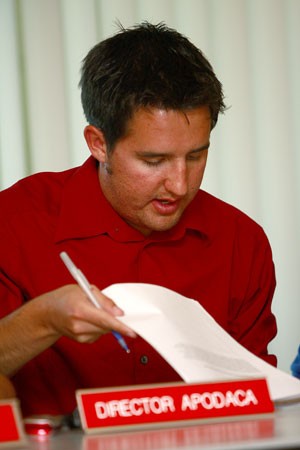An Appropriations Board decision yesterday left a UA campus club with cases of grape juice and almost $2,000 to raise.
A UA Jewish club was denied $1,900 in funding for its Passover celebration because of the presence of alcohol at the annual event.
The Associated Students of the University of Arizona Appropriations Board voted unanimously to leave UA Chabad Jewish Student Association’s event unfunded because of a bylaw.
The bylaw states that the board may not fund events that have alcohol present, said Jessica Anderson, executive vice president for ASUA.
Although the decision is a tough one for the board, the directors’ hands were tied by the bylaw, said Director Melodie Schwartz.
“”It’s not a matter of want. It’s a matter of need,”” she said. “”We’ve got to stick with the bylaws on this one.””
The Passover celebration includes a Friday night opening event where members share sacramental wine. The club did not ask for funding for the opening night, said Steven Strauss, vice president of UA Chabad Jewish Student Association.
The opening night typically receives about 80 students, while the Saturday event includes over 300 people, he said.
Strauss told the directors the wine in question was not going to be at the event, a decision that was made after ASUA raised concerns about the alcohol. The wine was replaced by grape juice, a decision the club believed would halt any funding complications, Strauss said.
The presence of wine was not removed from the club’s Web site promoting the event. Since the club had been promoting the event with alcohol for weeks and had not removed the notification of wine from its Web site, the risk was too great for ASUA, Anderson said.
If alcohol was present at the celebration, ASUA would be held responsible, and there would be consequences set out by administrators, she said.
“”We have a very no tolerance policy with that,”” Anderson said. “”It would be a disastrous mistake to go ahead with this.””
The presence of wine on the club’s Web site was the smoking gun that led to the board’s decision to leave the event unfunded, said director Andy Apodaca.
“”It’s concrete evidence,”” he said. “”It’s what we have.””
The inability of the club to remove wine from its Web site was simply a communication snafu and did not accurately represent the traditional use of wine for Passover. The event usually includes distributing a total of three one-liter bottles of wine to about 80 people. This results in each person receiving just a few ounces of wine, said Rabbi Yossi Winner of UA Chabad.
“”It’s not like people will be running around wasted,”” Strauss said.
Despite the separation of opening night from the rest of the Passover celebration, ASUA treats the event as a whole. When the Appropriations Board funds an event, it covers the entire event, Anderson said.
The board’s decision came as a surprise to UA Chabad, as the same event received funding last year under the same circumstances, Strauss said.
Although ASUA funded the celebration in 2007, the Appropriations Board and the rest of the organization should have more closely examined the decision, Anderson said.
To avoid canceling or postponing the event, the club is looking at options that would take funding from other Passover days’ events to pay for the tent, tables and materials needed to go on with the celebration, Winner said.
“”We’re currently looking for solutions,”” he said. “”We’re here to provide a home away from home for these students, and that’s what we’re going to do.””









